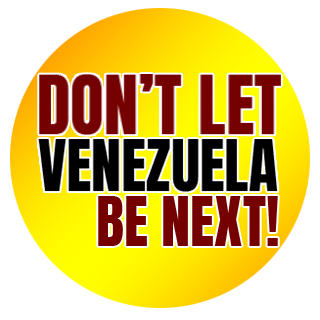Stop Venezuela from being next!
While Europe debates on whether to intervene in Venezuela to save the country’s citizens from narcoterrorist tyranny, the Russian Federation is already inside the country, without ever having requested authorisation from the institutions with the constitutional power to permit foreign forces to enter the territory. The Don’t Let Venezuela Be Next Campaign is a reminder of the Russian Federation’s recent unlawful actions in several countries around the world. It is also an appeal from civil society to the EU – as it makes decisions on its role in Latin America and puts forward strategies to support the restoration of democracy throughout the region – to take into account that the EU’s most powerful neighbour and political adversary is inside Venezuela with its weapons and specialised personnel, with the endorsement of the regime that has hijacked the country’s democratic institutions.
The expansionist aspirations of the former USSR continue to be at the top of the current Russian Federation’s agenda. Such aims take the form of interference, if not invasion, as has occurred in countries such as Montenegro, Ukraine and Belarus. The old ex-Soviet dinosaur cannot bear the loss of political influence resulting from the dismantling of the USSR and it has extended its reach all the way to Latin America. Europe must react!
Russian military presence in Venezuela
Venezuela has become the scene of an international ‘struggle’, and Russia is a dominant player in this conflagration. Nicolas Maduro’s regime has systematically violated Venezuelan sovereignty by allowing the incursion of Russian specialists. These incursions have been documented in official regime tweets, such as in May 2020, when the Strategic Integrated Defence Zone (ZODI) publicly reported that eight specialists from the Russian Federation’s Special Forces had joined its ranks to carry out tracking operations and assist in the capture of mercenaries, in flagrant violation of Article 187 of the Constitution, which states that foreign military missions can only be allowed in the country with the authorisation of the Venezuelan National Assembly (see the screenshot of the tweet that has already been deleted).
This was the first time that the presence of Russian soldiers conducting military operations in Venezuela had been officially documented; however, since January 2020, Russian soldiers were known to be mobilising in Venezuela wearing the uniforms of the Venezuelan army and using its barracks, helicopters, drones and other weapons. Since 2019, information has been revealed showing that Russians are staying in military and commercial hotels on the Colombian border and in the Bolívar state, the country’s mining area, where the Russians intend to occupy plots in the ‘Mining Arc’.
Relations between Russia & the Venezuelan regime (see pictures)
With regard to political interference, there is no doubt that while the Venezuelan regime has crossed over into illegality by admitting military forces into the country, Russian interference and imposition in political matters is more effective, though less visible. In February 2020, the Russian foreign minister travelled to Venezuela to reiterate his unconditional support for Maduro and openly stated that his position was a reaction against the pressure the international community was exerting by imposing sanctions on Venezuela.
It should be remembered that Russia is deeply involved in espionage activities, which has given the Maduro regime access to very advanced technology.
Economic dependence
With regard to Venezuelan finances, the country’s economy is bankrupt. It has continuously shrunk since 2014, according to the IMF, retracting almost 20% in 2018 and 35% in 2019. Some forecasts expect a 15% decline in 2020, while other analyses have put the figure at just over 10%. Between 2014 and 2020, Venezuela’s economy will have declined by an appalling 70%. Russia has restructured Venezuela’s debt with Moscow. The regime’s economy could be sustained without going bankrupt if it were not for Russian loans. This implies a dangerous dependence on the State.
The EU must accept the undeniable reality of Russian interference in Venezuelan politics. It is urgent for the EU to not lose sight of this reality in its diplomatic actions with both the Russian and Venezuelan authorities.
If Europetruly wants a solution for Venezuela and a return to democratic normality throughout Latin America, the EU should launch, without delay, a diplomatic campaign with the clear and undeniable aim of minimising the impact of Russian interference in Venezuela and in the rest of the countries of the American subcontinent. |
